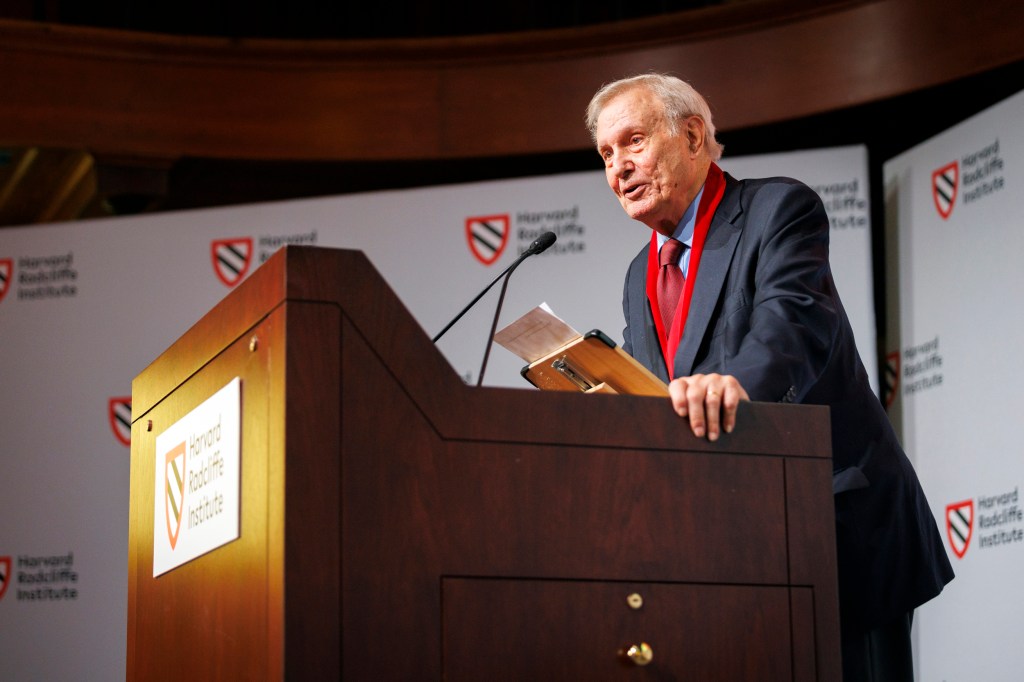Three Harvard presidents and two Nobel laureates gathered with Dean Tomiko Brown-Nagin final Thursday to commemorate the twenty fifth anniversary of the founding of the Radcliffe Institute for Superior Research.
Through the celebration, Brown-Nagin mirrored on the institute’s “distinctive legacy and noteworthy affect” and famous the numerous essential contributions made by Radcliffe pioneers, together with Mary Ingraham Bunting, a microbiologist and the school’s fifth dean, which finally led to the institute’s founding and success.
“Bunting was one of many predominant trailblazers. She was additionally acknowledging the numerous girls who have been educated at Radcliffe as college students who went on to turn into leaders in many alternative fields, together with prior directors going again to Radcliffe School who, in their very own approach, pushed/supported the thought of what finally turned the institute as we all know it in 1999,” she stated.
Brown-Nagin additionally introduced the launch of a brand new three-year initiative on tutorial freedom and a undertaking by Schlesinger Library to digitize its substantial assortment of archival materials from Radcliffe School’s personal 120-year historical past.
The Radcliffe Institute was established in 1999 following Radcliffe School’s formal merger with Harvard.
At its coronary heart is the fellowship program, which promotes interdisciplinary publicity for members, with a specific deal with lending a hand to feminine students, who, for years, have been very a lot within the minority of their departments and establishments and at a definite drawback when it got here to monetary {and professional} help.
“The purpose was twofold: to encourage and catalyze girls’s scholarly and artistic work and to find the circumstances that finest supported girls’s endeavors within the face of persistent societal obstacles,” Brown-Nagin stated.
Through the celebration, Harvard President Alan M. Garber spoke with distinguished economists Claudia Goldin and Oliver Hart about their careers, the interdisciplinary nature of their work, and the way at this time’s know-how might need reshaped their prior analysis.
They have been every awarded the Nobel Memorial Prize in Financial Sciences, Goldin in 2023 and Hart in 2016.
Each laureates spent a 12 months as Radcliffe fellows and recalled being challenged and impressed by their expertise participating with different fellows whose experience was outdoors of economics — arts and humanities, arduous sciences, and the regulation — and the way they have been ready to make use of the fellowship’s time and assets to pursue analysis that knowledgeable their later work.
Goldin, a labor economist who’s presently researching the numerous big steps girls have taken economically over the past a number of a long time and “why girls received,” talked about how she was capable of collaborate with former fellow Claudia Olivetti, a younger economist who turned a valued colleague, co-author and, finally, her finest buddy for the final 18 years.
“It was actually magical,” stated Goldin, a 2005-06 fellow, of her time at Radcliffe.

Hart, an financial theorist and a 2020-21 fellow, stated he’s most enthusiastic about what he’s engaged on now, analysis that builds on his earlier scholarship by forging another strategy to the normal approach authorized contracts are constructed. “I feel it could be, in the long term, my most vital,” he stated.
Garber, an economist and doctor, was appointed provost in 2011 by the then-President Drew Gilpin Faust, earlier than stepping in earlier this 12 months to function interim and now president. He acknowledged Brown-Nagin for her deep involvement in key College initiatives in recent times.
As a authorized scholar and historian, she chaired the group that produced the Harvard Legacy of Slavery report in 2022, which made suggestions to the College about redressing harms that occurred throughout its 400-year historical past.
Brown-Nagin presently co-heads a College working group on fostering “open inquiry and constructive dialogue” that Garber stated would quickly concern its personal report.
Gilpin Faust, president emerita of Harvard and the institute’s founding dean, offered a Radcliffe medal to Neil L. Rudenstine, the College’s president from 1991 to 2001, in recognition of his main function in reimagining the previous girls’s faculty into a sturdy heart of unbiased and interdisciplinary scholarship at Harvard.
Accepting this uncommon award, Rudenstine recalled the daunting problem earlier than them in these early days and the concern “whether or not we may presumably dwell as much as the thought of a really distinguished Superior Institute worthy of each Radcliffe and Harvard” that will flourish like Radcliffe School had over the earlier century.
At present, “the institute embodies, in my thoughts, precisely what we hoped it will do,” which was to maintain and embolden mental achievement and creativeness, stated Rudenstine.
“It’s accomplished a lot to convey Harvard in addition to Radcliffe to the fore in methods we by no means may have imagined 25 years in the past.”






























































